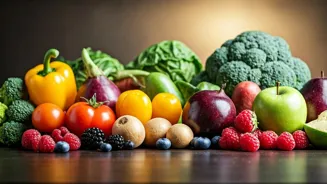Introduction to Diabetes
Type 2 diabetes is a chronic condition marked by the body's ineffective use of insulin, the hormone responsible for regulating blood sugar. This often
leads to elevated blood glucose levels, posing significant health risks. Managing this condition frequently involves a combination of lifestyle adjustments, including changes to diet and exercise, and sometimes, medication. Diet plays a crucial role, with the right foods potentially reversing the effects of the disease and improving overall health. Understanding the underlying mechanisms of diabetes and the impact of dietary choices is essential in the fight against this widespread condition. The aim is to provide actionable insights to help people manage their blood sugar levels and improve their quality of life. The initial focus should be on what causes this condition in the first place.
Leafy Green Vegetables
Leafy green vegetables are packed with essential nutrients and fiber, making them a cornerstone of a diabetes-friendly diet. Vegetables like spinach, kale, and lettuce are low in carbohydrates but high in vitamins, minerals, and antioxidants. The fiber in these greens helps slow down the absorption of sugar into the bloodstream, which prevents spikes in blood glucose levels after meals. Additionally, these vegetables contain antioxidants that can protect cells from damage. Consuming leafy greens regularly can significantly improve insulin sensitivity. Experimenting with different varieties and preparation methods can make these vegetables an enjoyable part of your daily diet. Including a generous portion of leafy greens with each meal can be a simple yet effective strategy for managing diabetes.
Fatty Fish Benefits
Fatty fish, such as salmon, tuna, and mackerel, are rich in omega-3 fatty acids, which have a range of health benefits, including the improvement of insulin sensitivity. These essential fats help reduce inflammation throughout the body, a factor that can interfere with the body's response to insulin. The omega-3s in fatty fish support heart health and reduce the risk of cardiovascular complications. Regular consumption of fatty fish can improve overall metabolic health and support weight management, which are key components in diabetes management. Aim for two servings of fatty fish per week to gain the benefits. This ensures you get a sufficient intake of essential nutrients to assist in controlling insulin levels.
Berries, A Sweet Treat
Berries are an excellent source of antioxidants and fiber, making them a perfect choice for individuals managing diabetes. Blueberries, strawberries, and raspberries are lower in sugar compared to many other fruits, but they provide valuable nutrients. The fiber in berries helps regulate blood sugar levels by slowing down sugar absorption. Furthermore, berries contain antioxidants that may protect against cell damage caused by high blood sugar. Including a handful of berries in your daily diet can satisfy your sweet tooth without significantly impacting blood glucose levels. You can enjoy berries in smoothies, salads, or as a snack. They make a healthy and delicious addition to any diabetes-friendly meal plan.
Whole Grains Advantage
Whole grains, such as brown rice, quinoa, and oats, are an essential part of a balanced diet, and particularly beneficial for people managing diabetes. They are packed with fiber, which slows down the release of glucose into the bloodstream, helping to prevent blood sugar spikes. Whole grains provide sustained energy, keeping you full and helping to control cravings. The fiber content also supports gut health and can aid in weight management, both of which are crucial for diabetes care. Replacing refined grains with whole grains in your diet can have a positive impact on your overall health and diabetes management. Incorporating whole grains into your diet is one of the simplest steps to take for improved health.
Nuts and Seeds
Nuts and seeds are packed with healthy fats, fiber, and protein, offering several benefits for those with diabetes. These foods help to slow down carbohydrate absorption, preventing rapid increases in blood sugar levels. The fiber content supports healthy digestion and can contribute to better blood sugar control. Nuts and seeds can also help with weight management, since they make you feel full. Including a small portion of nuts and seeds in your daily diet is a great way to boost nutrient intake and stabilize blood sugar levels. Be mindful of portion sizes, as nuts and seeds are calorie-dense. You can add them to your salads, cereals, or enjoy them as a snack to manage your diet.
Beans and Legumes
Beans and legumes, including lentils, chickpeas, and kidney beans, are excellent choices for managing and possibly reversing diabetes. These foods are rich in fiber and protein, making them a perfect combination for regulating blood sugar levels. The high fiber content slows down the absorption of sugar, preventing spikes after meals. Protein helps to keep you feeling full and satisfied, which aids in weight management. Beans and legumes also provide essential nutrients. Incorporating beans and legumes into your meals can be a delicious and effective way to improve your diabetes control and overall health. They can be added to soups, salads, or used as a base for meals.













